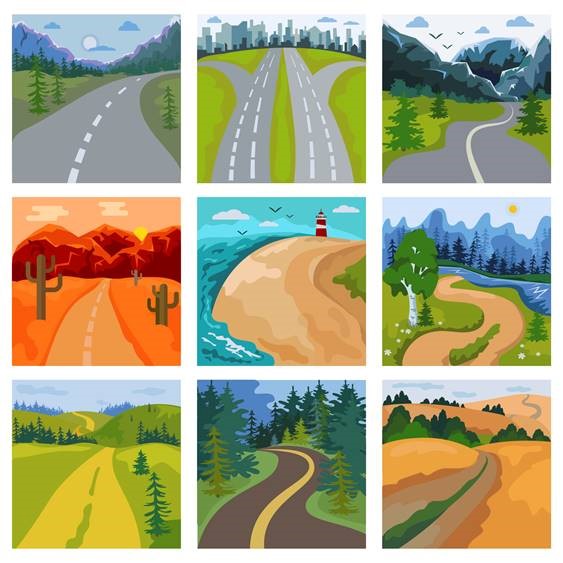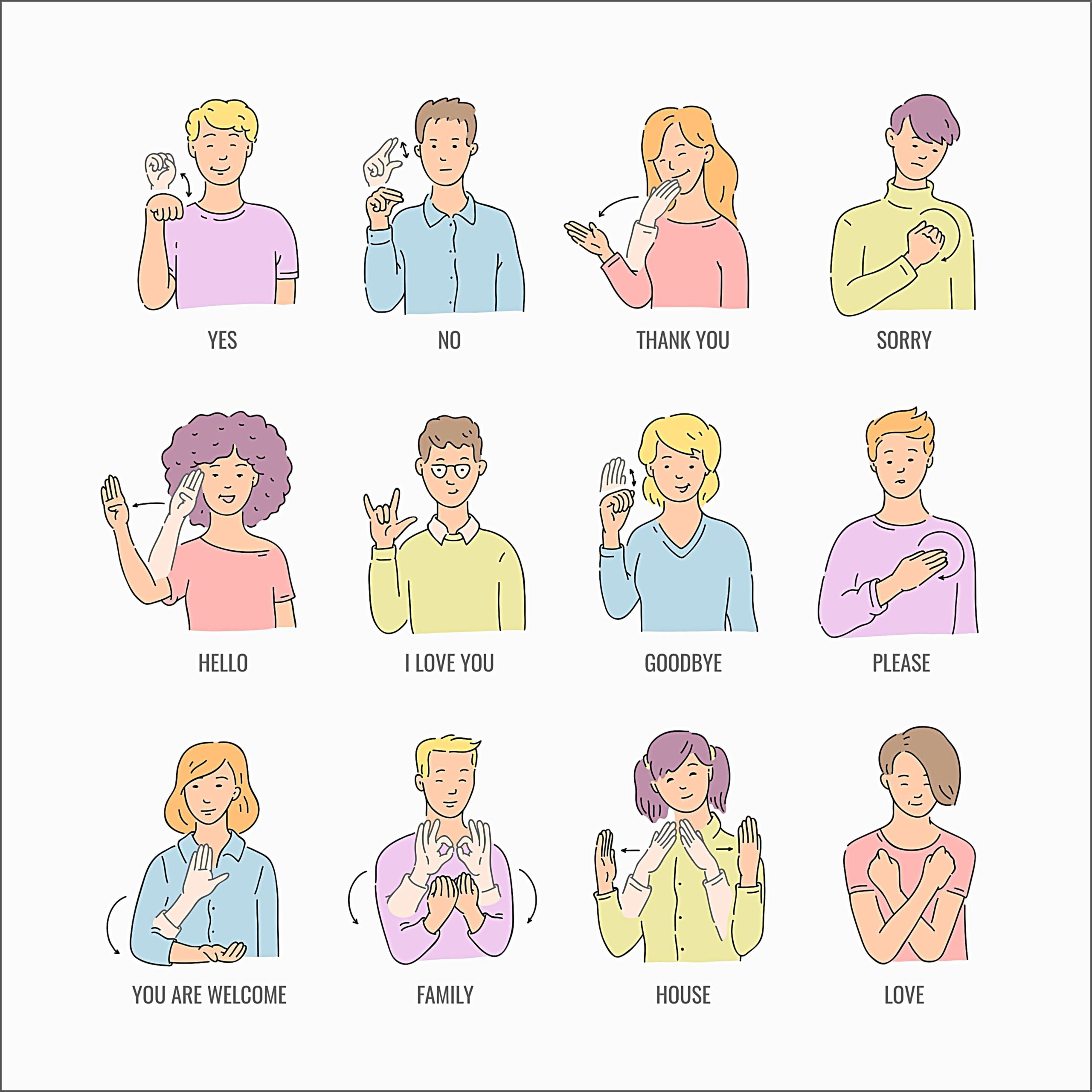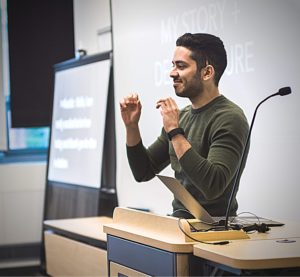



By Layli Miron
Deaf and Hard of Hearing people have a great deal to contribute to Baha’i activities, and with a few accommodations can more readily take part in them to everyone’s benefit.
This is a message championed by the Deaf and Hard of Hearing Task Force for the Baha’i community. Appointed by the National Spiritual Assembly of the Baha’is of the United States, the national governing council, the task force has existed off and on since the 1980s. Today, it has four members—Naledi Raspberry, Tavoria Kellam, Jason Schwartz and Erin Salmon—who, with assistance from people like Austin Vaday, are working to educate Baha’i communities about how to improve accessibility.


With a mission of ensuring that both groups can participate in Baha’i activities, the task force is endeavoring to connect with Deaf and Hard of Hearing Baha’is and ASL interpreters, to design events with captioning and interpretation, and to support local communities as they work toward accessibility.
Forging connections nationwide
When activities are designed without regard for disability, participants can face steep barriers, as Naledi Raspberry, a retired educator living in South Florida, has witnessed. While Raspberry is hearing, one of her sons, Akil, was born Deaf, so she served as his interpreter at Baha’i activities.
At one holy day celebration, Raspberry, falling behind the fast-paced, elevated English of the program, had to reduce its lofty message to signs meaning, “Baha’u’llah came for all of us.” Yet, as Raspberry queries, “If Baha’u’llah’s message is for all of us, why is it often presented only for hearing people?”
Connecting Deaf and Hard of Hearing Baha’is around the country is a step toward mitigating the linguistic isolation that, as Raspberry and her task force colleague Tavoria Kellam report, has caused some Deaf believers to drift away from participation. “We discovered in the 1990s that the length of time a Deaf Baha’i would stay active was just three months,” says Kellam, a professional interpreter in New York.
A Facebook page and a WhatsApp group, both called “Deaf in the Baha’i Community,” have enjoyed some success bringing together Deaf and Hard of Hearing Baha’is, as well as ASL interpreters. Through these channels, the task force can share invitations to accessible Baha’i events.
Designing accessible events
On February 20, the task force collaborated with the Baha’i House of Worship in Wilmette, Illinois, to host an online devotional gathering with ASL interpretation and captioning, and in March, it hosted another online gathering. It has also been preparing a group of interpreters to tutor a study circle in ASL.
Designing these events—especially the February devotional—revealed challenges that the task force is working to resolve with an eye toward hosting accessible events more regularly in the future.
To caption the devotional, Zoom’s automated transcription tool was used. This tool, however, badly—and offensively—mis-transcribed sacred Arabic and Persian terms. The task force is currently seeking an auto-captioning program that can understand Baha’i words, as live captioning can be prohibitively expensive.
The devotional’s ASL interpretation fared much better than the captioning. As attendee Austin Vaday remarks, it was an “opportunity to connect with others in the language I feel the most comfortable with.”
Kellam, Schwartz and Salmon obtained the readings in advance; collectively, they spent dozens of hours translating them into ASL. While the task force envisions having a library of Baha’i prayers in ASL, which would empower Deaf people to pray in their native language, none yet exists. So, each interpreter must figure out how to capture the prayer’s meaning.
Schwartz, a professional interpreter in Massachusetts, explains that to prepare to interpret the devotional, he “went through the prayers multiple times, read through them, sat with them, since you need to understand the content—and with Baha’i prayers, that’s on a whole other level since none of us really understand the deepest meaning!”
“As Baha’is we believe all people are family, we want our family to be treated with love and respect,” Salmon, a professional interpreter in Georgia, comments. “Providing access (captions/interpreters) shows respect and love for those we do not share a common language with.” Nationwide online events tailored to Deaf and Hard of Hearing people are a step forward. Accessible activities ultimately benefit everyone.


Supporting local communities
Many people know Austin Vaday, a software engineer in California and a Deaf Baha’i, from his TEDx talk, “Sign Language Is My Superpower.” According to Vaday, “the first and most important thing to understand is that accessibility is everyone’s responsibility.” In a Baha’i community, “each individual brings a different perspective to the table; we can’t always rely on one person to make it happen. Perhaps someone notices that a video being sent out is not captioned. . . Perhaps on another occasion, one might notice that a venue booked for a community event does not have a wheelchair-accessible ramp. These are just a few examples of seemingly minor questions to ask that could really make a difference for an individual in your community.”
Indeed, asking questions is a good first step. As Kellam recommends, “reach out and ask people what accommodations they might need and be prepared to work with them to figure out a plan.” Posing the question is a way of “telegraphing that we care and that we want to know,” she says—or, in Schwartz’s words, “it’s about putting our belief in unity into action.”
The next step is to build accessibility into the program. For Deaf and Hard of Hearing attendees, this means at the very least “making a document with the program,” Kellam says, “and if you have some basic tech, you can have someone type out the proceedings on a screen—the gist of what is being said.” For informal conversations, text messages or pen and paper facilitate conversations between Deaf and hearing friends.
Ideally, ASL interpretation would be provided for every public event, as well as at smaller activities with Deaf participants, says Vaday. Interpreters charge a fee, he notes, but that can be an investment in “building increasingly diverse communities.”
Baha’i communities with Deaf members can take the further step of studying ASL; for instance, as Raspberry suggests, when memorizing prayers, try learning the signs, too.
The task force invites communities learning about accessibility to get in touch with it through the Facebook page and WhatsApp group mentioned above, or by emailing bahai.deaf@gmail.com. As Raspberry says, “If anyone is at all interested–if Deaf, if Hard of Hearing, if an interpreter–we need you!”


![]()
![]()
Whether you are exploring the Bahá'í Faith or looking to become an active member, there are various ways you can connect with our community.
Please ensure that all the Required Fields* are completed before submitting.